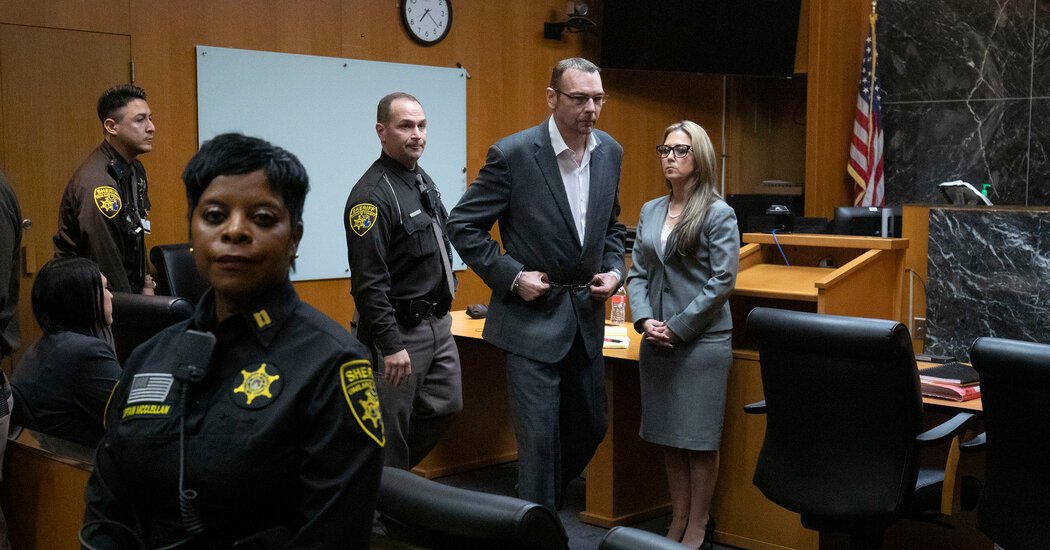A Michigan jury found James Crumbley guilty of involuntary manslaughter late Thursday over his failure to prevent his teenaged son from carrying out a school shooting that killed four fellow students and wounded seven others.
Mr. Crumbley’s wife, Jennifer Crumbley, was convicted of identical charges last month in the same Pontiac, Mich., courtroom, after a jury deliberated for roughly the same amount of time. The trials became a lightning rod for issues of parental responsibility at a time of high-profile gun violence by minors.
The parenting skills of each defendant came under intense scrutiny, as did the shooter’s access to a handgun that his father had purchased. Now, two separate juries have taken the unusual step of holding a parent criminally responsible for a child’s horrific crimes.
The repeated result “cements the concept that the prosecution here found a successful playbook, and they used it again,” said Mark D. Chutkow, a lawyer and former federal prosecutor in Michigan.
Oakland County prosecutors charged the Crumbleys three days after the Nov. 30, 2021, shooting at Oxford High School, where their son, Ethan, who was 15 at the time, killed Madisyn Baldwin, 17; Tate Myre, 16; Justin Shilling, 17; and Hana St. Juliana, 14, and injured seven others.
“James Crumbley was presented with the easiest, most glaring opportunities to prevent the deaths of these four students,” Karen McDonald, the prosecutor in Oakland County, said in closing arguments on Wednesday. “And he did nothing.”
Mariell Lehman, Mr. Crumbley’s defense lawyer, urged the jury to take into account how much Mr. Crumbley could not have known until it was too late. “You heard no testimony, and you saw no evidence, that James had any knowledge that his son was a danger to anyone,” she said.
Mr. Crumbley has been jailed since December 2021. He and his wife requested separate trials and unlike her, Mr. Crumbley chose not to testify in his own defense. Each will be sentenced later and faces a maximum of 15 years in prison.
Their prosecutions were seen as part of a national effort to begin holding some parents responsible for enabling deadly violence by their children. In the last few months, parents in other states have pleaded guilty to charges of reckless conduct or neglect after their children injured or killed others with guns.
But while Mr. Crumbley’s trial could serve as a playbook for prosecutors seeking to hold parents accountable, Mr. Chutkow said, the case is too unique to set a broad precedent. “It’s an outlier case, in that the number of red flags that the parents had were — there were just so many of them,” he said.
The witness lists in the two Crumbley trials were similar, but there were a few key differences in the evidence that was presented. At Ms. Crumbley’s trial, lawyers pored over her communications with her son, including months of text messages, as prosecutors tried to paint her as a detached and negligent mother.
But in the case of Mr. Crumbley, the testimony focused less on his parenting and more on the Sig Sauer pistol that prosecutors say he bought his son as an early Christmas present four days before the shooting.
Law enforcement officials who searched the Crumbleys’ home shortly after the attack testified this week that they had found the storage case for the gun lying open on the parents’ bed, along with an empty box of ammunition. They said there was no indication that the case had been locked.
In closing arguments on Wednesday, Ms. Lehman said that before the shooting, Mr. Crumbley did not know whether his son was aware of the handgun’s hiding place. During her rebuttal, Ms. McDonald pulled on a pair of gloves, picked up the murder weapon and a cable lock, and demonstrated for the jury that the gun could be locked in a matter of seconds.
Prosecutors also walked the jury through several entries in the shooter’s journal, including one that appeared to have been written the day before the shooting. “I have access to the gun and the ammo,” the entry said. “I am fully committed to this now.”
It was not clear whether either of the shooter’s parents had seen the journal entries before the shooting. But they were called to school on the morning of Nov. 30, after a teacher saw their son making violent drawings. Those drawings included an object that looked like the gun Mr. Crumbley had purchased, and phrases including “help me” and “blood everywhere.”
Neither the Crumbleys nor school officials searched the teenager’s backpack, which held the weapon.
Mr. Crumbley, wearing a gray suit and blue tie, appeared somber and shook his head lightly on Thursday evening as the jury’s four guilty verdicts — one for each count of involuntary manslaughter — were announced. Officers from the Sheriff’s Department then handcuffed him and led him from the courtroom.
Prosecutors called 15 witnesses to the stand in Mr. Crumbley’s trial, including people who saw the shooting and law enforcement officials who investigated it. The defense called only one witness: Karen Crumbley, the defendant’s sister. She said that until the shooting, she had never seen a reason to be overly concerned about her nephew.
Neither had Mr. Crumbley, according to his lawyer.
“He didn’t know,” Ms. Lehman told the jury. “He didn’t know what was going on with his son. He didn’t know what his son was planning.”
Ethan Crumbley pleaded guilty to 24 charges stemming from the shooting, including the first-degree murders of his four schoolmates. He was sentenced last year to life in prison without the possibility of parole and did not testify in either of his parents’ trials.

